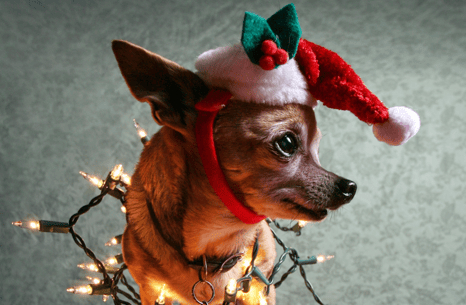
As the holiday season is approaching, below are some friendly reminders that we at Best Friends, as well as our pet parents should be aware of.
Holiday Ornaments and decorations: Holiday decorations such as old-fashioned bubble lights may contain poisonous chemicals. If a pet chews on them the liquid inside could be dangerous to their health. Glass ornaments that shine and shimmer are often an enticing toy for your pet and the small glass pieces can lead to cuts and irritation to the mouth and GI track. If any of these types of tree decorations are being used for your tree, it is recommended to keep them towards the upper portion of the tree. Tinsel, another holiday ornament should be avoided especially if you have cats, as these are attractive shiny toys to cats.
Liquid Potpourri/Oils/Candles: Filling your house with the smell of nutmeg or pine for the holidays may seem inviting—but if you’re partial to heating your scented oils in a simmer pot, know that they can cause serious harm to your cat. Even a few licks can result in severe chemical burns in the mouth, fever, difficulty breathing and tremors. Dry potpourri may also cause chemical burns in the mouth. While candles are often scented with oils, the largest concern with ingestion is a foreign body and potential obstruction.
Poinsettia plants: are only mildly toxic. Far more worrisome are holiday bouquets containing lilies. Just one or two bites of a lily can result in kidney failure in cats. Even the pollen and water that the plant is in are thought to be poisonous! Other yuletide plants such as holly berries and mistletoe can also be toxic to pets. When Christmas or English holly is ingested, it can result in severe gastrointestinal upset. If ingested, most pets smack their lips, drool, and head shake excessively due to the mechanical injury from the spiny leaves. As for mistletoe, most of us hang it high enough so it’s out of reach of our pets — nevertheless, it can also be toxic if ingested.
Holiday Foods: With the holiday season comes a delightful variety of baked goods, chocolate confections and other rich, fattening foods. However, it is not wise, and in some cases, quite dangerous, to share these treats with your pets. Keep your pet on his or her regular diet over the holidays and do not let family and friends sneak in treats. Foods that can present problems include:
- Foods containing grapes, raisins and currants (such as fruit cakes, breads and cookies) can result in kidney failure in dogs.
- Chocolate and cocoa contain theobromine, a chemical highly toxic to dogs and cats. Ingestion in small amounts can cause vomiting and diarrhea but large amounts can cause seizures and heart arrhythmias.
- Many sugarless gums and candies contain xylitol, a sweetener which is toxic to dogs. It causes a life-threatening drop in blood sugar and liver failure.
- Leftover fatty meat scraps can produce severe inflammation of the pancreas (pancreatitis) leading to abdominal pain, vomiting and bloody diarrhea.
When it comes to the holidays, the best thing a pet owner can do is to become educated on common indoor and outdoor household toxins and pet-proof your environment accordingly. If you think your pet has been poisoned, contact your veterinarian or Pet Poison Helpline at 800-213-6680 or www.petpoisonhelpline.com with any questions or concerns.




